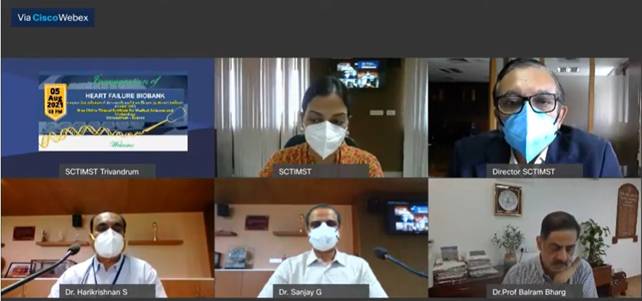India’s first bio-bank for heart failure research inaugurated at Sree Chitra Tirunal Institute for Medical Sciences and technology
New Delhi: The first National Heart Failure Biobank (NHFB) in the country that would collect blood, biopsies, and clinical data as a guide to future therapies was inaugurated at the Sree Chitra Tirunal Institute for Medical Sciences and Technology (SCTIMST). “There are no heart failure biobanks in the country, and this would greatly help in guiding future therapies and technologies and would benefit the heart failure patients significantly,” said Prof. Balram Bhargava, Secretary, Department of Health Research (DHR) and DG, Indian Council of Medical Research (ICMR) while inaugurating the NHFB virtually on 5th August. He added that the biobank will provide insights into heart diseases and heart failure among Indian children and adults, which are very different from that seen in the West.
Dr. V. K. Saraswat, President of SCTIMST and Member, NITI Aayog, in his message, hoped that the NHFB would prove very helpful in understanding molecular pathways and would improve the diagnosis, prognosis, and treatment of Heart Failure. “It will open a new era in research in Heart Failure in India and will change the persona of diagnosis and treatment of heart failure patients,” he said.
“The facility will be useful for the research and treatment of post-covid heart failure. The increase in the observed prevalence of long-COVID symptoms and post-COVID heart failure calls for long-COVID clinics to collect patient data and biospecimens that can be biobank for future research. Through the NHFB, researchers can get access to well-annotated biological specimens linked to clinical data while maintaining appropriate standards of quality and security. I sincerely hope that the NHFB will facilitate research both in India and abroad, helping clinicians and scientists to work together to understand and find solutions to heart failure-related morbidity and mortality. ” Prof. Ashutosh Sharma, Secretary, Department of Science & Technology (DST) pointed out in his message.
Prof. Ajitkumar VK, Director SCTIMST, explained that biobanks are important resources containing collections of high-quality biological samples of human body parts that can be used to understand molecular pathways and to improve the diagnosis, prognosis, and treatment of heart failure.
The principal investigator of the project and Prof. of cardiology at SCTIMST, Dr. Harikrishnan S, informed that the storage facilities include-20, -80-degree mechanical freezers and a liquid nitrogen storage system which can store bio-samples at – 140 degrees perpetually for years. Currently, there are facilities to store nearly 25000 biosamples.
The biosamples include the blood, serum, tissue samples obtained during open-heart surgery and peripheral blood mononuclear cells (PBMCs) and genomic DNA collected from heart failure patients. The biobank activity is supervised by a Technical Advisory Committee (TAC) with a member from ICMR.
The samples are collected after informed consent from patients who are willing to donate specimens. The samples stored and catalogued will be linked to clinical data such as physiological measures, imaging data like ECG, Echocardiography MRI, and follow-up data. Researchers and clinicians interested in research related to heart failure can collaborate with SCTIMST once the proposal is approved by the TAC and Ethics Committee of SCTIMST.
The Biobank at SCTIMST has already signed an MOU with InStem Bangalore for collaborative research in hypertrophic cardiomyopathy, which runs in families with thickening heart muscles.
With heart failure emerging as a major health problem in India, ICMR had initiated the National Centre for Advanced Research and Excellence in Heart Failure (CARE-HF) at SCTIMST for scaling up research in the field. The Heart Failure Biobank is one of the major components of the project, with a fund allocation of 85 Lakhs for developing state-of-the-art storage facilities.

